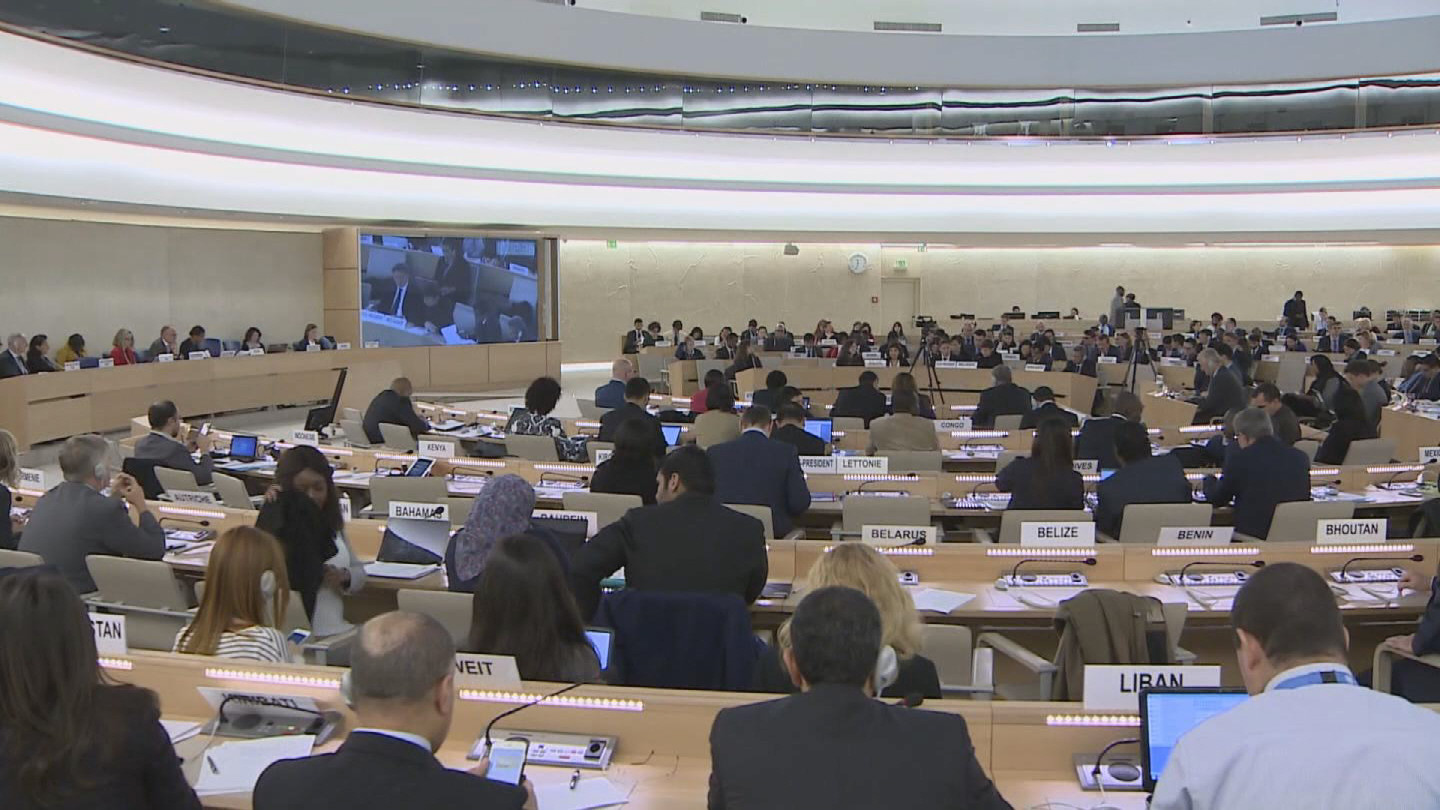GENEVA / COI ERITREA
Download
There is no media available to download.
Share
STORY: GENEVA / COI ERITREA
TRT: 01:50
SOURCE: UNTV CH
RESTRICTIONS: NONE
LANGUAGE: ENGLISH / NATS
DATELINE: 21 JUNE 2016, GENEVA, SWITZERLAND / RECENT
RECENT - GENEVA, SWITZERLAND
1. Wide shot, exterior, Palais des Nations
21 JUNE 2016, GENEVA, SWITZERLAND
2. Wide shot, Human Rights chamber
3. SOUNDBITE (English) Mike Smith, Chair of the Commission of Inquiry on Human Rights in Eritrea:
“The Commission found that the crimes it documented had been committed primarily, directly or indirectly by state and ruling party officials, military commanders and members of the National Security Offices. The Commission has identified alleged perpetrators and has compiled files on those individuals to assist future accountability mechanisms.”
4. Med shot, Eritrean delegate
5. SOUNDBITE (English) Mike Smith, Chair of the Commission of Inquiry on Human Rights in Eritrea:
“The Commission has concluded that the Government of Eritrea has neither the political will nor the institutional capacity to prosecute the crimes we have documented. We therefore recommend that the Security Council refer the situation in Eritrea to the prosecutor of the International Criminal Court and that the African Union establish an accountability mechanism.”
6. Med shot, Eritrean delegate from behind
7. SOUNDBITE (English) Mike Smith, Chair of the Commission of Inquiry on Human Rights in Eritrea:
“The Commission has also asked member states to prosecute or extradite suspects on their territories and at the Security Council imposed travel bans and freeze the assets of individuals suspected of crimes against humanity.”
8. Focus pool, Eritrean delegate to podium
9. SOUNDBITE (English) Yemane Ghebreab, Eritrean Presidential Advisor:
“Stepping way over its mandate, the Commission has made the incredible judgment that the human rights situation in Eritrea constitutes a threat to international peace and security as a pretext to send yet another African country to the International Criminal Court.”
10. Close up, Mike Smith
11. Wide shot, delegates
12. Med shot, panel
13. Tilt up, to ceiling of Human Rights Room
The Chair of the Commission of Inquiry (COI) on human rights in Eritrea, Mike Smith, told the Human Rights Council today (21 June) in Geneva that crimes against humanity have been committed in a widespread and systematic manner in Eritrean detention facilities, military training camps and other locations across the country over the past 25 years when the country gained its independence.
Smith said “the Commission found that the crimes it documented had been committed primarily, directly or indirectly by state and ruling party officials, military commanders and members of the National Security Offices. The Commission has identified alleged perpetrators and has compiled files on those individuals to assist future accountability mechanisms”.
According to the Commission “Eritrean officials have committed crimes against humanity, the crimes of enslavement, imprisonment, enforced disappearance, torture, persecution, rape, murder and other inhumane acts have been committed as part of a widespread and systematic campaigns against the civilian population since 1991. The campaign has been aimed at maintaining control of the population and perpetuating the Eritrean leadership role.”
Earlier this month the COI on human rights published a report stating that the Government of Eritrean President Issaias Afeworki is guilty of committing crimes against humanity since independence with up to 400,000 people "enslaved", and should face international justice.
Mike Smith said that “the Commission has concluded that the Government of Eritrea has neither the political will nor the institutional capacity to prosecute the crimes we have documented. We therefore recommend that the Security Council refer the situation in Eritrea to the prosecutor of the International Criminal Court and that the African Union establish an accountability mechanism.”
Furthermore, the Chair of the COI said that “the Commission has also asked member states to prosecute or extradite suspects on their territories and at the Security Council imposed travel bans and freeze the assets of individuals suspected of crimes against humanity.”
Eritrean Presidential Advisor Yemane Ghebreab told the Council, where he was defending his country against allegations of crimes against humanity that “stepping way over its mandate, the Commission has made the incredible judgment that the human rights situation in Eritrea constitutes a threat to international peace and security as a pretext to send yet another African country to the International Criminal Court.”
The COI on the situation of human rights in Eritrea was first established by the Human Rights Council in June 2014. The Commission’s first report was published on 8 June 2015 and documented a number of grave human rights violations in the State’s military/national service programmes, including their prolonged and indefinite duration. The COI was instructed by the UN’s Human Rights Council in July 2015 to further “investigate systematic, widespread and gross violations of human rights in Eritrea”.
Eritrea has repeatedly denied UN investigators access to the country. The COI conducted interviews in 13 countries with more than 800 Eritrean exiles.









